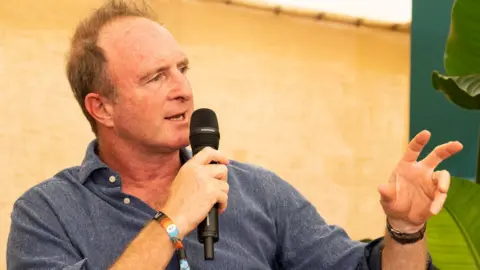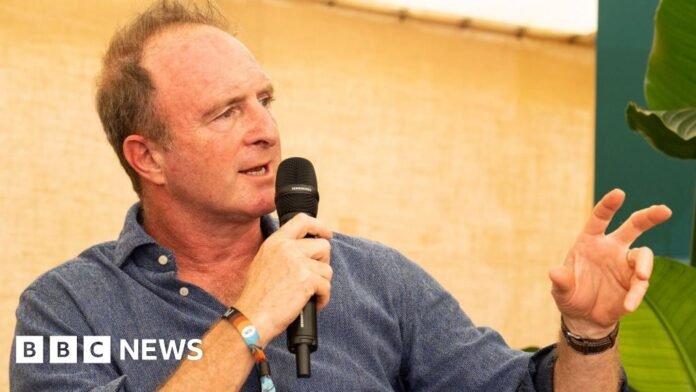Entertainment reporter
 Getty Images
Getty ImagesThe BBC should be protected from “political interference”, the corporation’s former director of news has said, after the culture secretary appeared to call for the resignation of director-general Tim Davie earlier this year.
Lisa Nandy said ministers expected “accountability at the highest levels” following the iPlayer broadcast of Bob Vylan’s highly controversial Glastonbury set in June.
James Harding, who previously edited the Times and now runs Tortoise Media, told the Edinburgh TV Festival the BBC should remain independent of government, and said Nandy’s close involvement in the Bob Vylan scandal was “chilling”.
In response, a DCMS spokesperson said: “The culture secretary has been repeatedly clear that the role of the director general is a matter for the BBC board. Any suggestion to the contrary is untrue.”
In his keynote MacTaggart Lecture, Harding said the perception of a “political presence looming over the BBC” is a problem and that the broadcaster needs to be “beyond the reach of politicians”.
Several staff were asked to step back from their duties after the live streaming of Bob Vylan’s Glastonbury set, where the punk duo led chants of “death, death to the IDF [Israel Defence Forces]” and made other derogatory comments.
Nandy’s subsequent call for accountability at the top of the corporation for the decision not to pull the live stream of the performance was subsequently interpreted as calling for Davie’s resignation.
In his speech, Harding criticised “political interference”, or the perception of it, in relation to the BBC, saying it was something “we’ve got too accustomed to”.
“The culture secretary’s office insists she did not explicitly ask Samir Shah, the BBC chair, to deliver up the director general’s resignation… but people inside the BBC were left in no doubt that was the message,” Harding said.
“Whatever your view of the hate speech vs freedom of speech issues, an overbearing government minister doesn’t help anyone,” he said. “The hiring and firing of [the director general] should not be the job of a politician.”
A DCMS spokesperson said: “The BBC has itself acknowledged a number of serious failings in recent months, including the broadcasting of the Bob Vylan set at Glastonbury. It is entirely right that the culture secretary raised these issues with the BBC leadership on behalf of licence fee payers.
“The government remains committed to the very important principle that the BBC is operationally and editorially independent. We are focused on securing a sustainable future for the BBC and helping strengthen public trust in the Corporation as part of the upcoming Charter Review.”
Read about previous MacTaggart Lectures:
The BBC has been criticised for a number of high-profile scandals in recent months, such as breaching its own editorial guidelines on accuracy in relation to a documentary about Gaza.
Elsewhere, Match of the Day host Gary Lineker left the BBC after sharing an Instagram reel about Zionism that featured an illustration of a rat, considered an antisemitic slur.
Harding said the BBC was “not institutionally antisemitic”, and that it was “untrue and unhelpful to say it is”, adding that it was “much better to correct the mistakes and address the judgement calls that have been wrong”.
He acknowledged the BBC had “made mistakes… and it can be much too slow to correct them”.
Referring to a debate early in the conflict about the BBC’s use of language, Harding said he thought it the BBC was “wrong not to use the word ‘terrorist’ for the attacks of October 7th; journalists shouldn’t censor words, but use them accurately”.
Harding did not comment on the events surrounding Lineker’s resignation, but did say he felt football pundits generally “should be able to have views as a citizen, as well as a job as a BBC broadcaster”.
Harding also used his speech to argue the BBC has a crucial role to play in defending truth in an age of artificial intelligence (AI) and declining trust in traditional media.
“A shared understanding of what’s true is disappearing before our eyes,” he said.
“More people are paranoid, prone to conspiracy theories. Large numbers of people are giving up on the idea of facts.”
He continued: “Politics and technology are doing untold damage to trust in the world.
“On the one hand, politicians are trying to control or cancel the media, particularly news. On the other, AI is beginning to lay waste to the economics of information, while also remaking the job of storytellers.”
In an age where “we’re more divided, more certain we’re right”, Harding argued, the BBC should be protected and championed as the “most important source of information in this country”.
He said the corporation was “the best defence of truth and trust against the lies of dictators and demagogues”.
The BBC’s royal charter will be up for renewal in 2027, and it has not yet been decided whether the licence fee will be replaced by a new funding system.
Harding reflected: “We’re at the beginning of a new information age, if we want it to be truly creative, innovative and competitive globally, we can’t short-change the BBC again.
“We need, surely, to be thinking about a mix of funding that gets closer to doubling its resources,” Harding said. “Because obviously, given the cost of living, that’s not going to happen just through the licence fee.
“Over five years, nearly two-and-half million households have dropped out of paying the licence fee, so this needs fixing. It’s expensive and unfair on those who pay. If we believe in the universality of the BBC, we need to return to the principle in some form or other that every household pays.”
Harding also suggested news and current affairs programmes could be opened up to independent producers in an effort to make the BBC more of a “people’s platform” and allow more varied thinking while maintaining standards of truth and accuracy.






